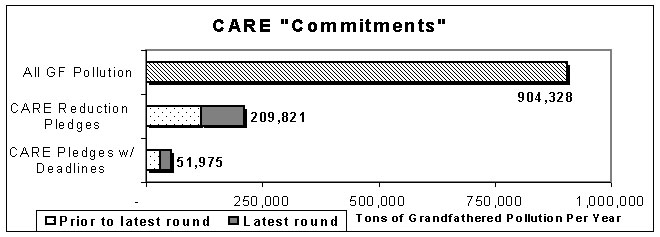

Texas Utilities executive Wade Stansell was quoted in notes on a private meeting with the Gover-nor’s staff in January 1997 as saying that the “utility industry is concerned about the entire concept [of regulating the grandfathered loophole but] if it doesn’t involve retrofits or money, maybe we can sell it.”
The fine print underlying a new round of pledges by “grandfathered” air polluters to voluntarily reduce their emissions—an-nounced April 16—reveals that top polluters continue to dodge solid commitments to emissions reductions.
Like the earlier CARE pledges, the latest round unravels when you delve
into such devilish details as:
* Exactly how much tonnage of grandfathered pollution will be
eliminated?; and
* By what deadline will these pollution reductions be realized?
This latest round of CARE pledges covers 54 facilities owned by 22 different companies. The new pledgers include Texas’ dirtiest grandfathered facility, ALCOA’s Rockdale plant, and the state’s biggest overall grandfathered polluter, Texas Utilities.
In 1997, the most recent year for which data are available, these 54 facilities produced 496,799 tons of grandfathered pollution, or 55 percent of Texas’ total.
Non-binding pledges
Just 17 of the 54 facilities pledged to reduce their grandfathered
emissions by a specific amount. These plants pledged to cut 92,550 tons
of pollution. This amounts to just 19 percent of the grandfathered
pollution produced by the 54 facilities and just 10 percent of Texas’ total
annual load of grandfathered pollution (904,328 tons).
Even these 17 pledges, however, are far from solid, since just one of them provided a compliance deadline. Only Degussa Corp.’s Carbon Black Plant in Aransas County pledged to cut a specific amount of pollution (22,000 tons) by a date certain (October 1999). This sole bona fide pledge represents just 4 percent of the pollution produced by the latest CARE volunteers.
AWOL at ALCOA
ALCOA’s Rockdale plant, which accounts for 12 percent of all grandfathered
pollution in Texas, was among the new non-committal pledgers.
ALCOA spokesperson Jim Hod-son acknowledges that ALCOA’s “commitment” lacks a deadline as well as a quantifiable emissions-reduction target. Hodson said the company did not know when it would seek to obtain a TNRCC air permit.
Texas Utilities’ new pledge to reduce 20,000 tons of grandfathered pollution at 13 plants by an unspecified date amounts to just 8 percent of those plants’ grandfathered pollution.
Phantom gains
The alleged emission reductions that the TNRCC attributes to some CARE
pledges are fictions fabricated with the use of outdated data.
Chevron Chemical’s Harris County plant, for example, reported four
tons of grandfathered emissions in 1997. In the new round of
pledges, this same Chevron plant is credited with volunteering to slash
its grand-fathered emissions by 160 tons,
40 times its most recently reported annual emissions of grandfathered
pollution.
TNRCC employed this same dubious method to calculate misleading emissions reductions for some earlier CARE pledges, including Marathon Ashland’s Texas City Refinery and Valero’s Basis Petroleum plant in Galveston.
The latest CARE round brings the program’s total volunteer pollution-reduction pledges up to 209,821 tons. Of this amount, just 51,975 tons involve hard commitments tied to compliance deadlines. These hard commitments would eliminate just 6 percent of Texas’ grandfathered pollution.
New loopholes
Nonetheless, bills that would formalize Bush’s CARE program are
sailing through the Legislature, picking up ever-widening loopholes.
SB 766, authored by Sen. Buster Brown and Rep. Ray Allen, is headed to the House floor with amendments that reward polluters for taking actions that do nothing to reduce their emissions of grandfathered air pollution.
The bill, for instance, would grant air permits to polluters who create “wildlife preserves” or who allow their employees to telecommute.•

# # #
Texans for Public Justice is a non-partisan, non-profit policy &
research organization
which tracks the influence of money in politics.